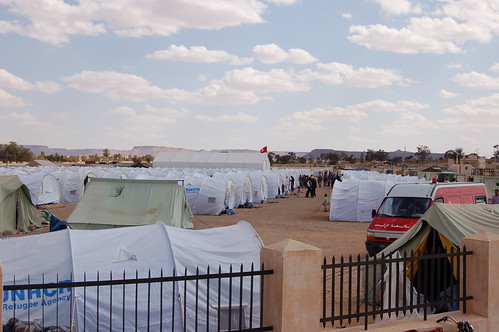Fonte: World Medical Camp for Libya
In recent weeks attacks on the civilian population in the western and Nafusa Mountains have intensified. Towns such as Zintan, Wazin and Nalut have witnessed intensified bombardment and attacks. Ordinary civilians have found themselves caught up in the middle of the fighting. Most of the refugees arriving at the border have little more than the clothes on their backs. About 2,500 people cross into Tunisia daily using informal routes to escape their homes.
Civilians have been targeted on purpose with regime forces deliberately killing farm livestock and burning agricultural land. As a result, thousands of families, women, children and the elderly have been forced to flee their homes taking minimum belongings with them. Desperate to escape the fighting, they have endured a dangerous and arduous journey to the Tunisian border. Once they have crossed the border they have sought refuge at the camps which have been set up by aid organisations such as the UAE Red Crescent and the UNHCR. There are another 40,000 refugees being either hosted by Tunisian families or renting property that has been offered by locals in different towns in southern of Tunisia.
WMCL programme officers recently returned from visiting three refugee camps, in Dahiba, Ramada and a youth hostel in Tatawin which has been converted into a shelter for hundreds of refugees.

Dahiba
The refugee camp here is being run by the UAE Red Crescent. Our programme officers report that the conditions in the camp are very satisfactory, with large habitable and secure tents provide for each family. There are clean and adequate washing and sanitation provisions, food and water are also well provided for. The camp is fenced and secure. The management and running of the camp is efficient and effective.
Remada
Remada Camp, which is located 50 kilometres from the Tunisian-Libyan border, continues to function as a reception point for Libyans who arrive and stay for a short period and then move to a more permanent place.
Our programme officers were shocked at the contrast in the living conditions in Remada compared to that they had witnessed in Dahiba. This camp was set up by the UNHCR who provided basic materials and equipment but then they have contracted implementing partners, usually local NGOs or charities, to actually manage the camp. Our programme officers have reported that this has led to chaos.
The conditions are bad, with as many as 3,000 people living in very inadequate tents with poor toilet facilities and without sufficient security. Food and drink is available, but there was a lack of medical supplies and clothing.
The dire conditions have been exasperated by recent sand storms that have resulted in tents being blown away and the ones that have survived are practically inhabitable as they became filled with sand. As a result, many families left the refugee camp to look for refuge elsewhere. Still, 1,108 refugees remain and amongst this number there are 182 children including 9 with a permanent disability and 6 pregnant women.
Tatawin
The town of Tatawin is has about 300 refugees who have been housed in a youth centre by the local community. They live in a desperate situation because they are not being looked after by any charity or NGO. Different aid groups had passed through but no one has taken responsibility for their care. As a result they have had to organise themselves as best as possible – for instance, one doctor among the refugees had, as the best-educated man there, begun to take charge to make sure that they receive adequate food and water. However, their living conditions are dire with old and flimsy bedding for mattresses. They lack proper washing and sanitary facilities.
The Need
When the refugees escaped the fighting, particularly from the Western mountains, the weather was cold and they fled the fighting with what they were wearing. But now in south Tunisia it is getting hotter and hotter and they need different clothing.
Our programme officers conducted a number of interviews with the refugees and NGO workers in all three refugee camps. They have identified the following humanitarian aid as being the most essential and urgent needs for the Libyan refugees in the Tunisian camps
- Clothing for the dry hot dessert weather conditions
- Female hygiene products such as sanitary towels
- Diapers
- Sanitation and washing products such as anti-bacterial wipes

Our Appeal
We respectfully urge you to donate to our refugee appeal so that we can purchase quantities of the above aid from Tunisia and deliver it directly to the refugee families in need. They have witnessed fighting and the destruction of their homes and livelihood. They need our support more than ever during this desperate time.

Nessun commento:
Posta un commento